2006 Yorkshire Regional Championships - Second Section retrospective
9-Mar-2006No fault of the bands, the conductors, the players or even the judges on this one, but the Second Section turned out to be a bit of a lottery - except there were no real winners.
When does a brass band contest become a lottery? When you get a couple of adjudicators in the box who don't know what they are doing? No, that was possibly elsewhere on the weekend at Bradford. Or what about when the bands and conductors have no understanding of how to musically approach a test piece? No, that was also possibly elsewhere on the weekend too.
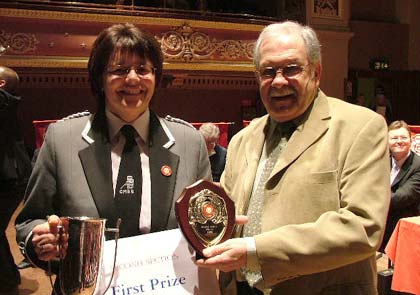
Hope springs eternal - Grange Moor's representative enjoys that winning feeling
No, it becomes a lottery when bands are presented with a test piece they simply cannot play to an appreciable degree of musical or technical competency. In these cases it is not the bands, the conductors or the players fault one iota. It is the fault of the people who chose the test piece in the first place. You can still pick a winner, but it like picking a winner after a game of Rollerball. You can't imagine a great deal of satisfaction when you are last man standing after taking a beating like this.
The Music Panel have a very difficult task in choosing test pieces for the Regional Championships, but in the past two years they have made some awful choices in the Second and Third Sections. In their defence they have also made some inspired choices in the others sections (notably this year in the Fourth, First and Championship), but for some reason they have totally misjudged the abilities of bands at this level for two years in a row, both at the Areas and at the National Finals.
That was so apparent at this contest. Ten very brave bands took to the stage here on Sunday, and ten very brave bands left after attempting to play Howard Snell's ‘Images of the Millennium' in varying states of battle fatigue. It was like a musical triage centre at times – the mortally wounded in need of the last rights, the badly injured in need of a lengthy period of rehabilitation and the scarred and shell shocked in need of a strong cup of tea and a sympathetic bit of counselling.
Not one band got close to playing the test piece here, but all gave 100% in pursuit of the cause, with the winners and runners up the two bands that had enough strength of purpose, the resolve and ability to overcome the landmines of potential disaster that littered the score. The bands, conductors and players deserved medals for their efforts, the Music Panel should be court marshalled for inflicting musical GBH.
It also meant one heck of an unenviable task for the two adjudicators Chris Wormald and Ian Brownbill. These are two of the best young generation of judges on the circuit; talented and professional, knowledgeable and sympathetic to the bands at this level, but also very clear about what they want to hear from the bands when they take to the stage to perform. When two men of this ability have to pick their way through a veritable car crash of performances to try and pick out morsels of hope and quality, then you know something is radically wrong.
Both men also deserve a medal for their efforts too. Chris was first up to speak to the audience before the announcement of the results and made the oblique, but very telling remark that he wasn't going to be dragged into the ‘politics' surrounding the decision to use this test piece at this level. However, his arched eyebrow and neat sense of ironic delivery spelt it out as clear as day.
Ian too, with his welcome trademark honesty made the equally telling remark of comparing what the players had to perform here with what he was going to be asked to play on third cornet in the Championship Section later on in the day. Both judges got it bang to rights.
They also got it right with the final decision to award first place to Grange Moor, with the runners up spot going to Meltham and Meltham Mills. These were the two performances on the day (although Wakefield in particular pushed them close) that made the most of what they could from the very difficult score.
Both will head for Harrogate relieved we are sure that this hurdle is now out of the way, whilst others may not be so lucky. As one conductor told 4BR after the announcement of the results: "It is not a question of recruiting players, it is a question of retaining them that is the greatest concern for bands. Asking them to slog away for weeks on end to try and play a piece they didn't enjoy and have little or no hope of overcoming is a like the bands writing their own suicide note. Why would anyone enjoy playing when you have pieces such as this chosen for them to tackle as a hobby?"
Grange Moor will have found this perhaps the greatest test they have faced since coming back to contesting in 2003. Duncan Beckley is an excellent band trainer at this level (perhaps without equal in the country over the years) and he brought every last once of his experience and inspirational leadership qualities to guide his band through the piece. 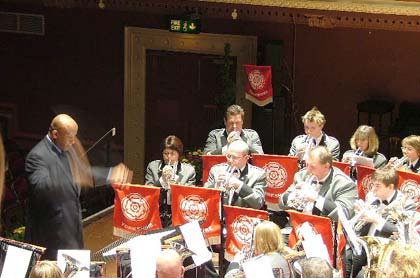
Just follow the beat! Duncan Beckley guides Grange Moor to victory
The opening Scherzo was taken at a proper scherzo tempo, whilst he intelligently opted to ensure the basics of balance and tuning were in place in the ‘Nocturne' where the marking requires bands to try and play with a dream like quality. The final ‘Odyssey' also had just that right agitated feel whilst the MD also ensured that his players just had enough left in the tank not to run out of steam in the final straight.
That ending reminded you of the last part of the Grand National – just after the last fence when it seems there isn't long to go, only for the jockey and horse to be faced with the long trek past the elbow and the race for home. Remember ‘Crisp' all those years ago, knackered and meandering, at the point of exhaustion and literally crawling on memory to the finishing tape only to be overtaken by Red Rum on the line? That was what it was like for the bands here - knackered, red raw lungs and lips like burst cushions. And all for what purpose?
Grange Moor has improved year on year under Duncan's tutelage and are now something of record holders having won three consecutive Regional titles at three different levels in three years. Only Jayees (Queensbury) Band more than a few years ago has equalled this. Their Band Secretary was obviously delighted, but relieved when he spoke to 4BR after the announcement of the results. Marion Matthewman said:"I'm a bit lost for words. It's fantastic to win again, especially as we found this such a difficult test piece. It's our third Area title in the last three years, and we are enjoying playing under Duncan even when it is such a difficult test piece. He gives us so much confidence."
Grange Moor is a good band, with a core of talented players and a very able MD. That they managed to get thought this test shows that come Harrogate they will be a formidable force to be reckoned with.
There was also a great deal of relief on the face of band representative Andrew Eastwood from Meltham and Meltham Mills who collected the second prize award. Meltham must have killed a whole litter of black cats on the way to the contest in 2000 for ever since they have been drawn number 1 at the contest – six years in a row in fact.
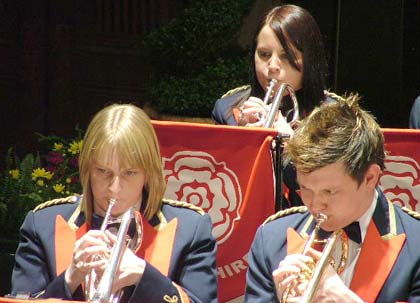
Harrogate here we come - Meltham's cornet section head for the finals
They took to stage under Stuart Fawcett and laid out a competent account that was also intelligently directed by the man in the middle, especially as Stuart only had the three basses at his disposal. The opening Scherzo had the right feel about it, whilst the Nocturne held together well even though the percussion underlying accompaniment was a bit viscous. 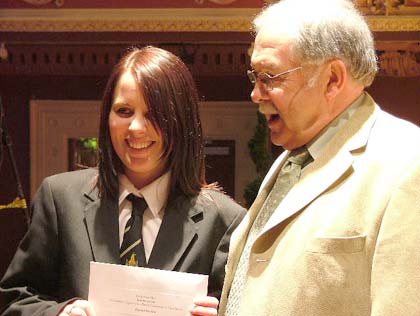
Magnificent Maynard- The sop star takes her prize
They also benefited from Laura Maynard on soprano who was excellent throughout, with a pure tone and a clever head on her shoulders that made sure she never blew herself out and kept something in reserve right to the end. Some of her piano playing was as good as we heard all weekend and she fully deserved to pick up the ‘Best Soloist' award.
It was just the last section that perhaps robbed them of the chance to pip Grange Moor, who was Red Rum to their Crisp at the end, whilst the decision to ask the bass trombone player to whack the tam tam just about worked, although it meant that the bass sound lacked depth at the conclusion. Still, on a day when there was a huge casualty list this was a performance of character to say the least.
The other band to come closest to making a real performance of the test piece was Wakefield Metropolitan under Russell Gary (the tall one, not the shorter version). This was another intelligent approach to marshalling the resources on offer, and after a compact opening the MD allowed the music to try and come through in the Nocturne. 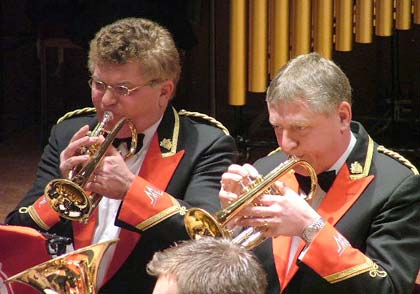
Can't beat experience can you now - Wakefield's elder statesmen pike it out
A fine flugel player and rounded bass sound helped, but it just lacked a bit of flow (the percussion accompaniment lacked focus) and security to close. The final ‘Odyssey' nearly came off, but the last stamina sapping section really hit hard and just took the edge off what was a brave and committed performance.
After the top three it was a question of collateral damage and it was difficult to disagree with the judges for the order in which the bands finally panned out.
There was no disgrace in any of the performances on show, but it was obvious, painfully at times, that the piece was beyond the bands. That so many got through as they did says a great deal about them as players and conductors alike, but it was hard to pick out any playing of real quality.
Ian Brownbill had made the earlier point of suggesting that some MDs could have made more of the opportunity when it presented itself of making the final movement more dramatic, but that was asking a great deal indeed. Chris also made the point that in the first movement perhaps more care could have been taken with the tempo making too. Circa 86 means just that – ‘about' 86, not 106 as one or two tried as a means to cover up the technical problems with speed and a mish mash of sound.
Frickley/South Elmshall came home fourth under the direction of Dave Nichols, and whilst there was much to commend about the approach, much of the good brass work was undone by something of a cabaret performance from one of the percussionists. Here was a very good player putting on a performance Bobby Crush would have been proud off – all arms and affectations, and whilst it was obvious he could play his part, he made sure everyone heard (and saw) that he could too. In the end it obliterated much of what was going on, and even though we may well be wrong, we think the judges may have just noticed too and cut a few marks accordingly.
Slaithwaite also put in a brave account that had its moments under the direction of Barry Hudson. A weak start was overcome by some able playing; especially from the young girl on solo cornet, but a weak middle section where the percussion (two young lads who played well in the other sections) went a touch awol and a tired final movement saw them lose ground.
Much the same could also be said of South Yorkshire Police under Andrew Dennis, who had a neat up tempo start. The second movement was a struggle, but there was an excellent girl on percussion who held things together well, whilst the final movement became hard and harsh somewhat, especially in that killer last section where the timps were miles out of tune. Again, it was a performance that had the hallmarks of a decent band playing a piece that at present was beyond their capabilities.
Wetherby and District tried hard but never quite managed to get to grips with the technical problems, and although they had their moments – most notably with a fine solo cornet it struggled the longer it went along and by the end it was on its last legs. Another brave effort though.
The same for Kippax too under the energetic Keith Wardle who really did try his very best to bring the most he could out of his players. It was the speed that killed off any chances in the first movement (the quickest of the day in the Scherzo) and it became hard and harsh in the other two movements too as they struggled to overcome the technical questions laid out in the score.
Strata could possibly have come higher up the prize list after David Hirst opted for a sensible approach to the tempos in particular, but had no control over the legion of small individual errors that blighted the performance from the word go. By the end they were coming thick and fast, but the enthusiasm of the players to try their best to give what they could to the cause was something to admire.
Finally, Dinnington Colliery under the baton of Toby Bannan who took to the stage with just three basses, 1 euph and a couple of cornets down and still battled their way through the piece. That says a great deal about this talented young conductor and his band to show that commitment to the cause, and even though they were bloodied and shot to pieces at the end, they left the stage unbowed and a credit to Yorkshire for their grit and determination. It wasn't pretty, but by heck it made you feel proud.
That seemed to sum up the contest as a whole in fact. Fantastic commitment and bravery to the cause of individual bands on a test piece that was at times cruel and unforgiving. We hope it hasn't caused any payer to think of giving up or for any conductor to think of breaking their baton in despair. Hopefully Grange Moor or Meltham and Meltham Mills will show everyone that the sacrifice has been worth it come the Finals in Harrogate.
Iwan Fox and Malcolm Wood.















